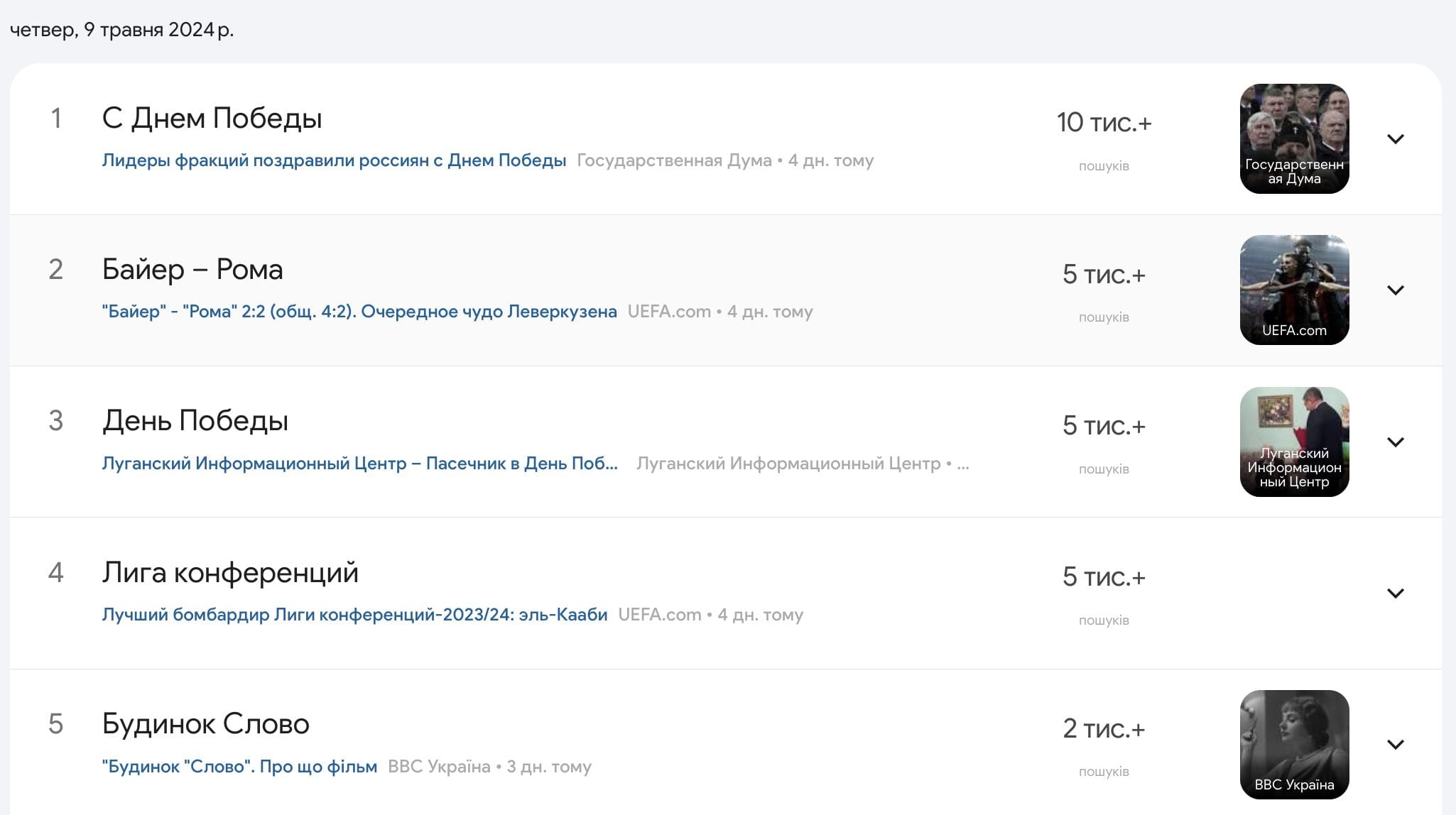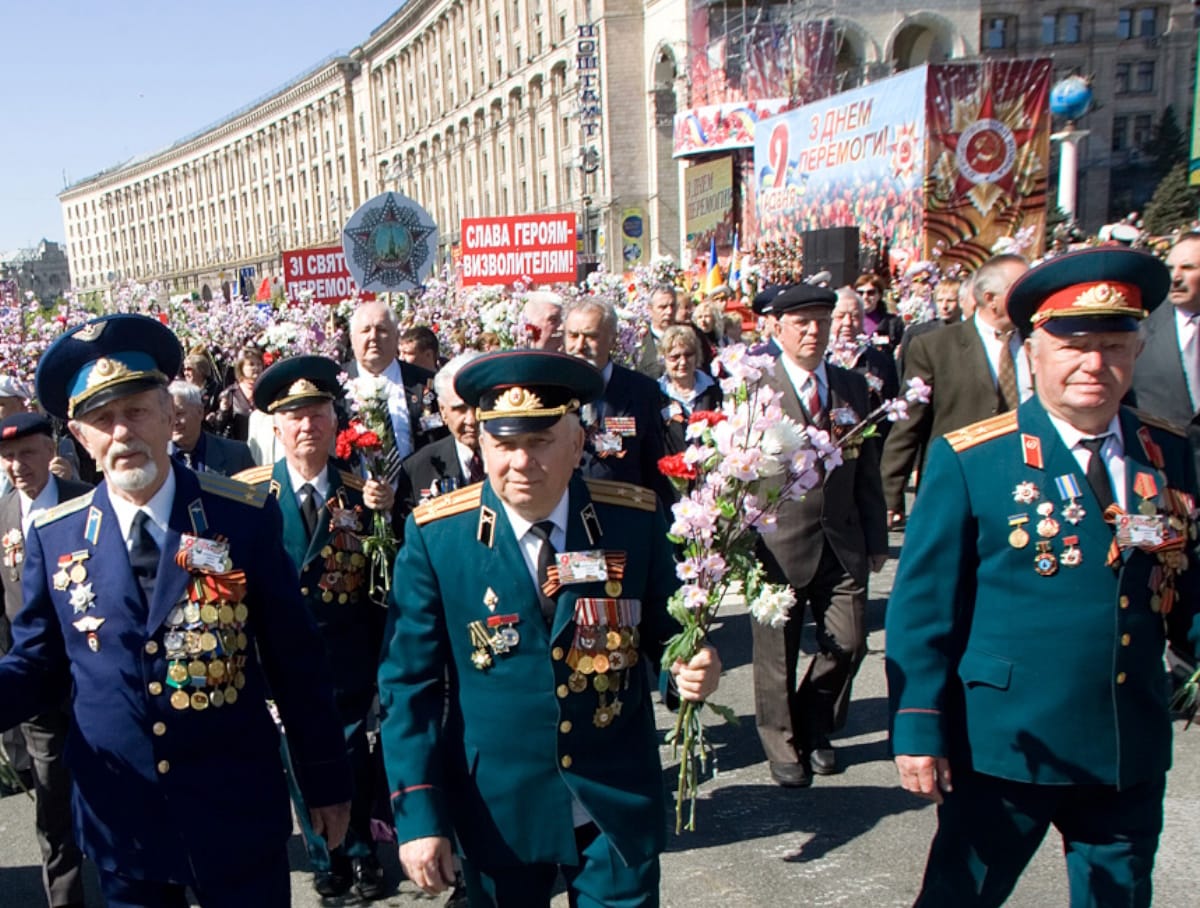On the day of the 79th anniversary of the end of the Great Patriotic War, Russian media wrote that residents of Ukraine are very actively interested in Victory Day on the Internet. We checked how correct these publications are.
It was reported that, despite the postponement and renaming of the holiday of victory over Nazism to May 8, the search query “Victory Day” (in some sources - “Happy Victory Day”) took first place in Google Trends in Ukraine. The statement is accompanied by evidence - a screenshot from the service page. “Checkmate, Ukrainian junta!” — commented on the news in the Telegram channel “Ukraine.ru"(127,000 views at the time of writing this analysis).
The Russian media wrote about this “Gazeta.ru", "Russian spring", "Biysk worker", "Version" And "InoSMI" The news was widely disseminated on Telegram thanks to the channels “Operation Z: military correspondents of the Russian spring"(427,000 views), "RT in Russian"(148,000), "Ukraine.ru"(127,000), "Tsargrad-TV"(46,000).
Since 2015, Ukraine has celebrated two official holidays related to the events of 1941–1945: the Day of Remembrance and Reconciliation (May 8) and the Day of Victory over Nazism in World War II (May 9). In June 2023, the country's President Vladimir Zelensky signed law, according to which May 8 became the Day of Remembrance and Victory over Nazism in the Second World War of 1939–1945 (on the same day of celebration pass and in many EU countries). And on May 9 in Ukraine, as well as in the EU countries, from now on noted Europe Day, dedicated to the anniversary of publication Schuman Declaration - in it in 1950, the French Minister of Foreign Affairs Robert Schuman proposed to establish European Coal and Steel Community, which was later transformed into the EU. However, many Russian media wrote specifically about the cancellation of the celebration of Victory Day in Ukraine in any form, and not about the postponement.
In Russia, the reaction to the legislative change among neighbors was ambiguous: in the Human Rights Council under the President of the Russian Federation, what happened called another stage in the degradation of power in Ukraine, and in the State Duma they expressed hope, that local residents will be able to decide for themselves when to celebrate the holiday, keeping in mind primarily veterans. In Ukraine itself, opinions vary: judging by street polls conducted by journalists, many support the transfer, and some call this issue unprincipled. Chairman of the Council of the Kyiv Organization of Veterans, Disabled Persons and Young Prisoners of Fascism, 89-year-old Georgy Sinyuk assured Deutsche Welle correspondent that the veteran community will celebrate both days.
Service Google Trends allows you to estimate the frequency of search queries for certain phrases on given dates, in a specified region and the required category, as well as identify the main search trends over the last day and last week. In the list of the most popular queries for May 9, 2024 in Ukraine, the queries “Happy Victory Day” and “Victory Day” are indeed occupy first and third places respectively.

The viral screenshots, however, show other indicators: more than 2,000 and more than 1,000 requests, respectively. The difference can be explained by the fact that the media and Telegram channels began publishing news in the first half of the day on May 9, and therefore they contained incomplete information.
Google Trends also allows you to find out in which regions of Ukraine within internationally recognized borders the query “Happy Victory Day” had the greatest relative popularity. The first five places in this indicator are occupied by Sevastopol, Crimea, Lugansk, Donetsk and Kherson regions, the seventh place is occupied by Zaporozhye region.

At the same time, according to condition at the beginning of May, Crimea, Sevastopol, almost the entire Lugansk region, significant parts of the Donetsk, Zaporozhye and Kherson regions of Ukraine were under the control of Russian troops.

The unevenness is also visible in the distribution of the relative popularity of queries by locality.

A similar situation is observed with the request “Victory Day" If we compare its relative popularity with the same indicator for the request “Kiev” on May 9, we can see that in the vast majority of Ukrainian regions controlled by the government of the country, the name of the capital comes ahead by a margin.

Thus, the statistics in viral publications were not presented entirely correctly - for example, they did not take into account that queries related to Victory Day were popular primarily in Ukrainian regions occupied by the Russian army.
According to polls Kyiv International Institute of Sociology, the popularity of Victory Day in Ukraine has been declining since at least 2010. Researchers regularly conduct surveys in which they ask respondents from different regions of the country to name the five most important and favorite of ten public holidays (including, for example, New Year, Christmas, Easter and Independence Day). In 2010, Victory Day was included in this top five by 58% of respondents, in 2013–2021 - from 30% to 40%, in 2024 - only 11%.
In all likelihood, this is due not only to the full-scale Russian invasion of Ukraine, but also to the fact that the celebration of Victory Day over the past years has been actively privatized and subsequently used in its policies by the Kremlin. How note numerous historians, in modern Russia, May 9 in particular and the memory of World War II in general are used to build a new post-Soviet identity and ideological legitimation of the regime.
Cover photo: Wikimedia Commons
Read on topic:
- Is it true that on May 9, projections with inscriptions about Russia’s victory appeared on the White House, the Reichstag and the UN headquarters?
- Is it true that on May 8, 2023, the red Victory Banner was again hoisted over the Reichstag in Berlin?
- Is it true that Ukraine has deprived veterans of the Great Patriotic War of support?
If you find a spelling or grammatical error, please let us know by highlighting the error text and clicking Ctrl+Enter.






